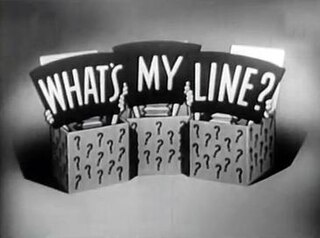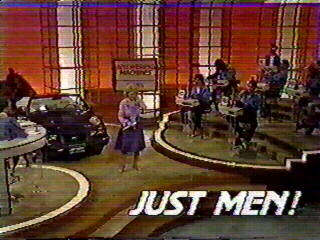
Match Game is an American television panel game show that premiered on NBC in 1962 and has been revived several times over the course of the last six decades. The game features contestants trying to match answers given by celebrity panelists to fill-in-the-blank questions. Beginning with the CBS run of the 1970s, the questions are often formed as humorous double entendres.

Richard Wagstaff Clark was an American television and radio personality and television producer who hosted American Bandstand from 1956 to 1989. He also hosted five incarnations of the Pyramid game show from 1973 to 1988 and Dick Clark's New Year's Rockin' Eve, which broadcast New Year's Eve celebrations in New York City's Times Square.

Pyramid is an American game show franchise that has aired several versions domestically and internationally. The show was developed by Bob Stewart. The original series, The $10,000 Pyramid, debuted on March 26, 1973, and spawned seven subsequent Pyramid series. Most later series featured a full title format matching the original series, with the title reflecting an increasing top prize. The game features two contestants, each paired with a celebrity. In the game, the contestants and celebrities attempt to identify words or phrases through clues given by their teammates. The title refers to the show's pyramid-shaped gameboard, featuring six categories arranged in a triangular fashion. The various Pyramid series have won a total of nine Daytime Emmys for Outstanding Game Show, second only to Jeopardy!, which has won 13.
To Tell the Truth is an American television panel show in which four celebrity panelists are presented with three contestants and must identify which is the "central character" whose unusual occupation or experience has been read aloud by the show's moderator/host. When the panelists question the contestants, the two impostors may lie whereas the "central character" must tell the truth. The setup adds the impostor element to the format of What's My Line? and I've Got a Secret.

What's My Line? is a panel game show that originally ran in the United States, between 1950 and 1967, on CBS. The game show started in black and white and later in color, with subsequent U.S. revivals. The game uses celebrity panelists to question contestants in order to determine their occupation. The majority of the contestants were from the general public, but there was one weekly celebrity "mystery guest" for which the panelists were blindfolded. It is on the list of longest-running U.S. primetime network television game-shows. Originally moderated by John Charles Daly and most frequently with regular panelists Dorothy Kilgallen, Arlene Francis, and Bennett Cerf, What's My Line? won three Emmy Awards for "Best Quiz or Audience Participation Show" in 1952, 1953, and 1958 and the Golden Globe Awards for Best TV Show in 1962.

Password is an American television game show in which two teams, each composed of a celebrity player and a contestant, attempt to convey mystery words to each other using only single-word clues, in order to win cash prizes.

I've Got a Secret is an American panel game show produced by Mark Goodson and Bill Todman for CBS television. Created by comedy writers Allan Sherman and Howard Merrill, it was a derivative of Goodson–Todman's own panel show, What's My Line?. Instead of celebrity panelists trying to determine a contestant's occupation, however, as in What's My Line, the panel tried to determine a contestant's secret: something that is unusual, amazing, embarrassing, or humorous about that person.

Wordplay is an American game show which ran on NBC from December 29, 1986 to September 4, 1987. It was hosted by Tom Kennedy, with Jamie Farr substituting for Kennedy for one week of shows, and announced by Charlie O'Donnell. The show was produced by Scotti Bros.-Syd Vinnedge Television in association with Fiedler/Berlin Productions and Rick Ambrose Television.
Liar's Club is an American game show, originally produced by Ralph Andrews, featuring a panel of celebrity guests who offered explanations of obscure or unusual objects. Contestants attempted to determine which explanation was correct in order to win prizes.

Mindreaders is an American game show produced by Goodson-Todman Productions which aired on NBC from August 13, 1979, through January 11, 1980. Although NBC originally agreed to a 26-week run, the network canceled Mindreaders after 22 weeks. The host was Dick Martin and the announcer was Johnny Olson, with Jack Narz subbing. The program was taped at Studio 4 at NBC in Burbank, California.

Just Men! is an American game show that aired on NBC Daytime from January 3 to April 1, 1983. The show starred Betty White, who won an Emmy award for her work on the show, with Steve Day announcing. It pitted two female contestants who were asked to predict answers to a series of yes/no questions posed previously to a panel of seven male celebrities.
Scattergories is an American game show on NBC daytime hosted by Dick Clark, with Charlie Tuna as announcer, that aired from January 18 to June 11, 1993. The show, which was adapted from the Milton Bradley board game of the same name, was produced by Reg Grundy Productions and was the second to last American game show to be produced by the company.
It Takes Two is a game show in which contestants gave numerical answers to questions. The original program was created and produced by Ralph Andrews and aired on NBC from March 31, 1969, to July 31, 1970, at 10:00 AM Eastern. A second version, produced by Mark Phillips Philms & Telephision, aired on The Family Channel in 1997.

You Don't Say! is an American television game show that had three separate runs on television. The first version aired on NBC daytime from April 1, 1963, to September 26, 1969, with revivals on ABC in 1975 and in syndication from 1978 to 1979. The last two incarnations were executive produced by Ralph Andrews and produced and directed by Bill Carruthers.

The Price Is Right is an American game show produced by Mark Goodson-Bill Todman Productions, wherein contestants placed successive bids on merchandise prizes with the goal of bidding closest to each prize's actual retail price without surpassing it. The show was a precursor to the current and best-known version of the program, which premiered in 1972 on CBS's daytime schedule. It makes The Price Is Right one of only a few game show franchises to have aired in some form across all three of the Big Three television networks.
PDQ and Baffle are American television game shows created by Heatter-Quigley Productions. Both shows' objective was for contestant/celebrity teams to guess a given word or phrase in the shortest amount of time with the fewest letters given as possible.
Get the Message is a television game show produced by Mark Goodson and Bill Todman which aired on ABC's daytime schedule for nine months in 1964.

Showoffs is an American television game show which ran on ABC from June 30 to December 26, 1975. Bobby Van was host, with Gene Wood as announcer. The Mark Goodson-Bill Todman production involved two teams competing in a game of charades.
Snap Judgment is an American daytime game show hosted by Ed McMahon and announced by Johnny Olson which ran on NBC from April 3, 1967, to March 28, 1969, at 10:00 AM Eastern. The program was created and produced by Mark Goodson and Bill Todman.

The Object Is... is a game show which aired on ABC from December 30, 1963 to March 27, 1964. The series was the first game for host Dick Clark. Mike Lawrence was the announcer.













